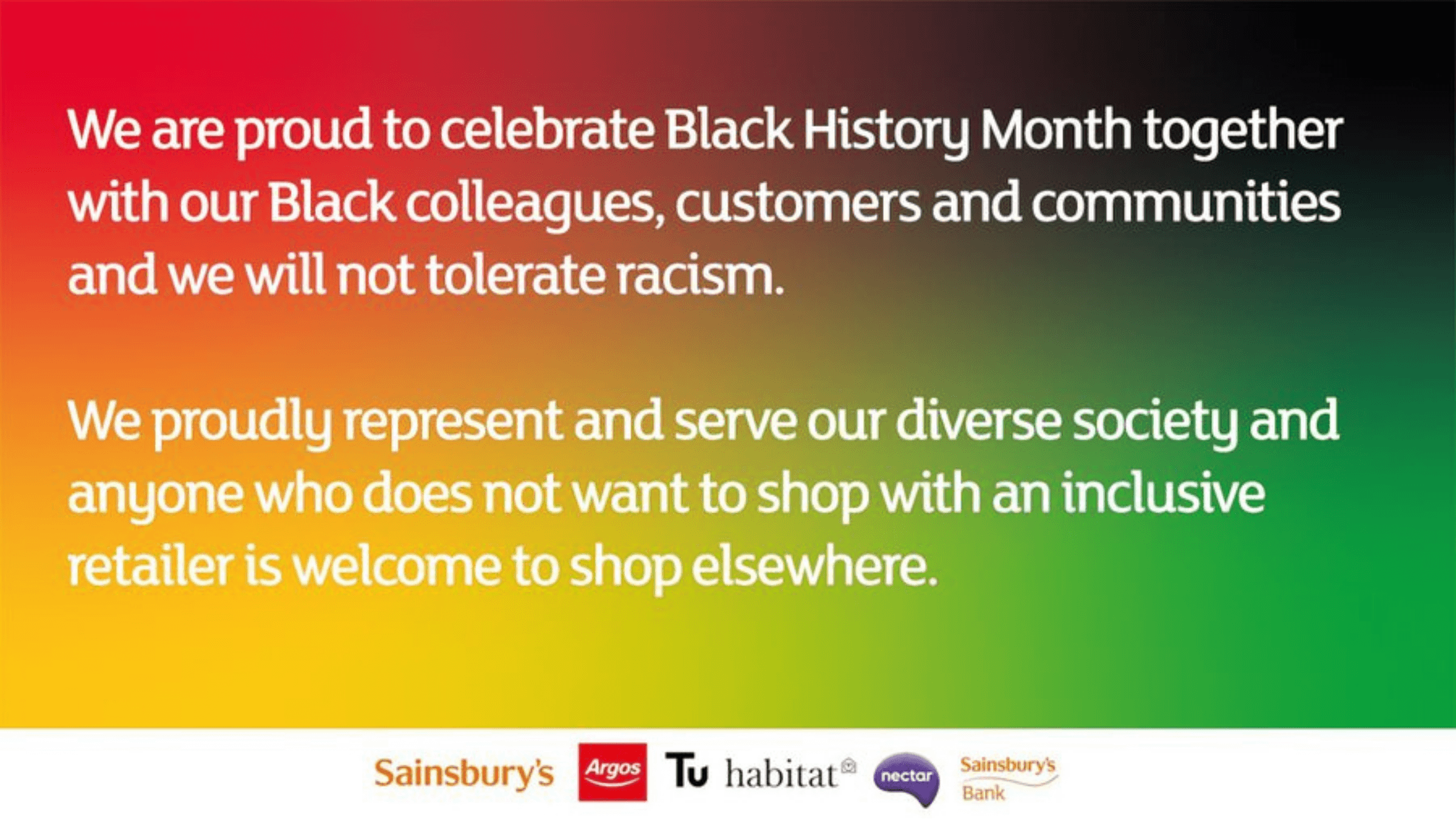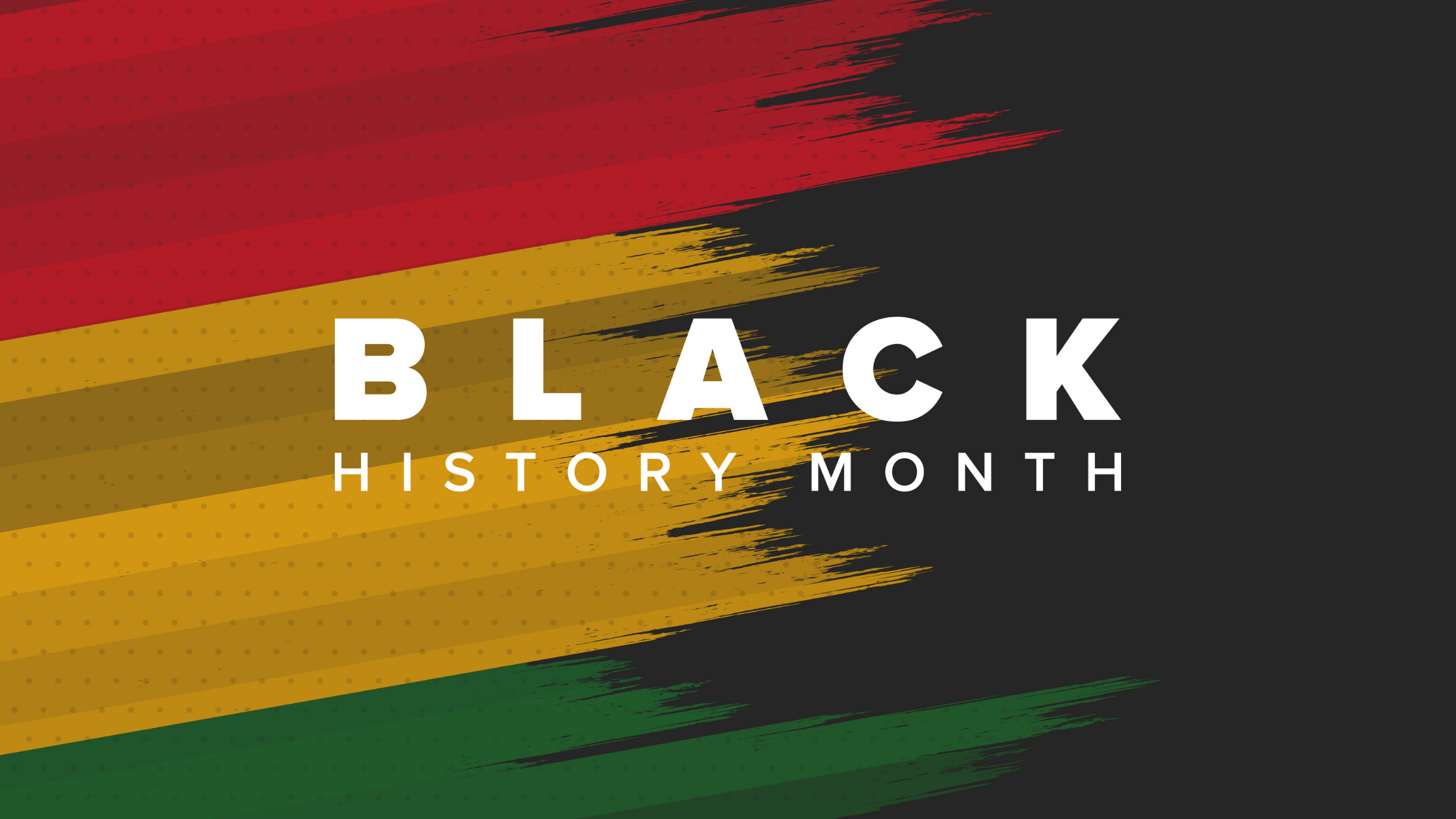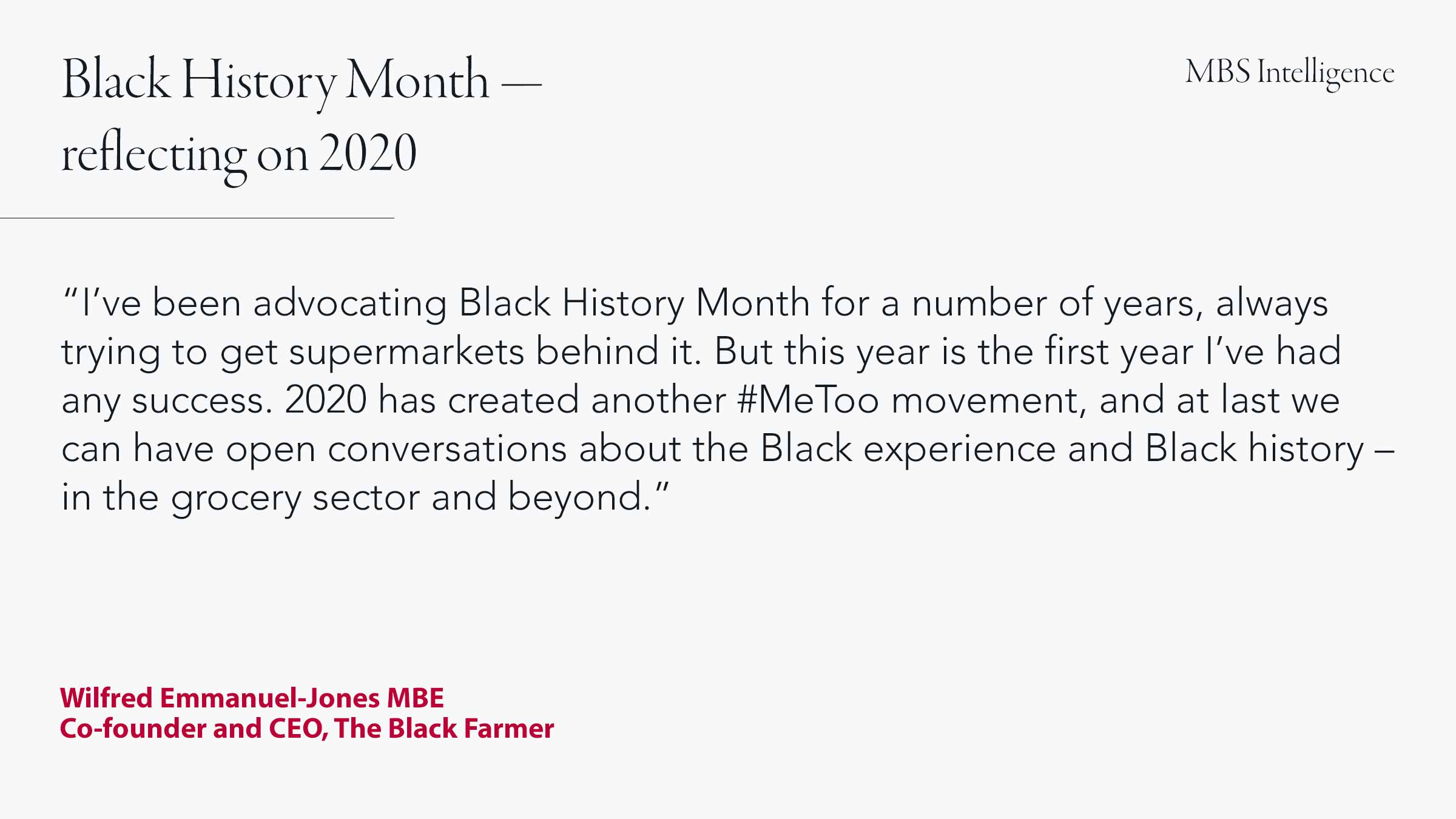Black History Month was founded in the UK in October 1987, organised through the leadership of Akyaaba Addai-Sebo, an officer of the Greater London Council. Since this time, year after year, Black History Month has been a chance to celebrate Black voices and champion the Black contribution to our collective history and culture. We’ve grown used to seeing schools, museums, brands and businesses alike engage in the event, but this year it feels more important than ever, with new meaning and an urgent sense of purpose.
The events of this year – Covid-19’s disproportionate impact on the Black, Asian and minority ethnic community, the murder of George Floyd and the subsequent growth of the Black Lives Matter movement – have accelerated the conversation around racism and race relations in the UK, and we have seen this shift at play in the consumer-facing sector.
Wilfred Emmanuel-Jones, co-founder and CEO of The Black Farmer, who we spoke to earlier this month, compounded this view, telling us that: “I’ve been advocating Black History Month for a number of years, always trying to get supermarkets behind it. But this year is the first year I’ve had any success.
“It’s created another #MeToo movement,” he continued, “and at last we can have open conversations about the Black experience and Black history – in the grocery sector and beyond.”
I have never seen so much engagement in Black History Month, or indeed the topic of racism, as this year. As part of and separate to Black History month, many businesses in our sectors have come out and made clear commitments to championing diversity and condemning racism.
Importantly, in May, Co-op CEO Steve Murrells became the first retailer to condemn the death of George Floyd and make a public commitment to remove discrimination and judgement from Co-op’s operations. Sainsbury’s made a similarly strong statement at the beginning of October, inviting those “who do not want to shop with an inclusive retailer” to shop elsewhere. The Big Four grocer announced plans to roll out a number of internal measures, including renewing its ethnicity pay gap and creating more ‘safe spaces’ for its Black colleagues to share their views.
Such moves have been seen elsewhere in the retail sector, too. As part of Black History Month, John Lewis Partnership announced a series of actions aimed at building a more inclusive company. One such development was the launch of the Partner Advisory Group, working with partners from under-represented groups to create a new diversity and inclusion strategy. As well as focusing on employees, the Black Partner Advisory Group will review JLP’s products in fashion and food to ensure they are inclusive and representative for customers.
There’s also been lots of activity in the tech space, largely due to its user-driven nature. Spotify, TikTok, Depop and the dating app Bumble have marked Black History Month by championing Black voices on their platforms, rolling out collections in collaboration with Black creatives or using the occasion to showcase new, internal policies to support Black employees. Other examples can be found in the media, with ITV’s ‘It’s All About’ campaign and new commissions from Channel 4 focused on Black history and the Black experience.

One thing is for sure: Black History Month is weighing more heavily on the consumer sector’s collective consciousness than in previous years. But the big question is: is our sector doing enough? While these statements and corporate changes are certainly steps in the right direction, there is much more work to be done. In the consumer-facing sector and beyond, structural barriers to diversity need to be dismantled for true progress to be made.
Businesses and governments alike have to actively work to avoid unintended consequences from the fallout of Covid-19. In the public sphere, Covid-19 has been found to disproportionately impact those from Black, Asian and minority ethnic communities, who are more likely to contract, and die from, the virus. A recent report published by government advisor Dr Raghib Ali attributed this to factors such as jobs and housing, while an alternative report published by the Labour Party argues that Black, Asian and minority ethnic communities have been “over-exposed, under-protected, stigmatised and overlooked during this pandemic […] The impact of Covid-19 is not random, but foreseeable and inevitable, the consequence of decades of structural injustice, inequality and discrimination that blights our society.”
Such discussions also exist in the corporate sphere. Last month, research from The MBS Group found that Covid-19 has exacerbated existing inequalities in businesses, resulting in Black, Asian and minority ethnic employees being more likely to be furloughed or lose their jobs. Whilst our research was focused on the hospitality, travel and leisure sector, a subsequent publication from McKinsey has confirmed that this remains the case elsewhere, and has also found that ethnic minorities are more likely to be negatively impacted by future automation and workplace transformation. Looking ahead, leaders must take pointed and urgent action to guard against the unintended consequences of present and future people policies.
“At The MBS Group, we are proud to have championed diversity for over thirty years, and believe that businesses must embrace diversity as a central, business-critical priority. Not only because it is the right thing to do – but because it is a commercial imperative in today’s world.”
A vital step for businesses looking to increase their commitment to diversity is to collect the relevant data. Research from The MBS Group, across different areas of the consumer-facing sector, has found that too few businesses are actively gathering race and ethnicity data on their employees. While the prospect of mandatory ethnicity pay gap reporting has in some cases sped this process up, there are still many businesses that lack accurate data by which to measure progress of diversity or assess the impact of its people policies in events such as Covid-19.
At The MBS Group, we are proud to have championed diversity for over thirty years, and believe that businesses must embrace diversity as a central, business-critical priority. Not only because it is the right thing to do – but because it is a commercial imperative in today’s world. In our current commercial landscape, many executives are rightly focused on survival, and it can be tempting to see diversity as a luxury or a ‘nice to have’. But as businesses move through the next stages of Covid-19, it is crucial to recognise the business case for diversity: according to data from McKinsey, ethnically diverse executive teams are 36% more likely to outperform homogenous ones.
Here at The MBS Group, we like action and we will therefore be participating in the 10,000 Black Interns programme, co-founded by Dawid Konotey-Ahulu (a co-founder of Redington Limited and mallowstreet), Jonathan Sorrell (President of Capstone Investment Advisors), Michael Barrington-Hibbert (founder of Barrington-Hibbert Associates) and Wol Kolade (Managing Partner of Livingbridge) in August 2020. Following the launch of 100 Black Interns, the 10,000 Black Interns initiative has been designed to help transform the horizons and prospects of young Black people in the UK. The 10,000 Black Interns programme will offer paid work experience across a wide range of sectors, providing training and development opportunities and creating a sustainable cycle of mentorship and sponsorship for the Black community.
Critics of Black History Month, on both sides of the political spectrum, argue that the event is tokenistic. Nevertheless, we believe that marking the occasion with education and reflection, if done seriously, can help pave the way for positive action on diversity and equality. It has been a pleasure to see the renewed vigour and urgency with which some businesses have responded to Black History Month this year, but, most importantly, we hope and expect to see tangible action and new policies in place to drive real and lasting change for the better.
Moira.benigson@thembsgroup.co.uk | @MoiraBenigson | @TheMBSGroup









